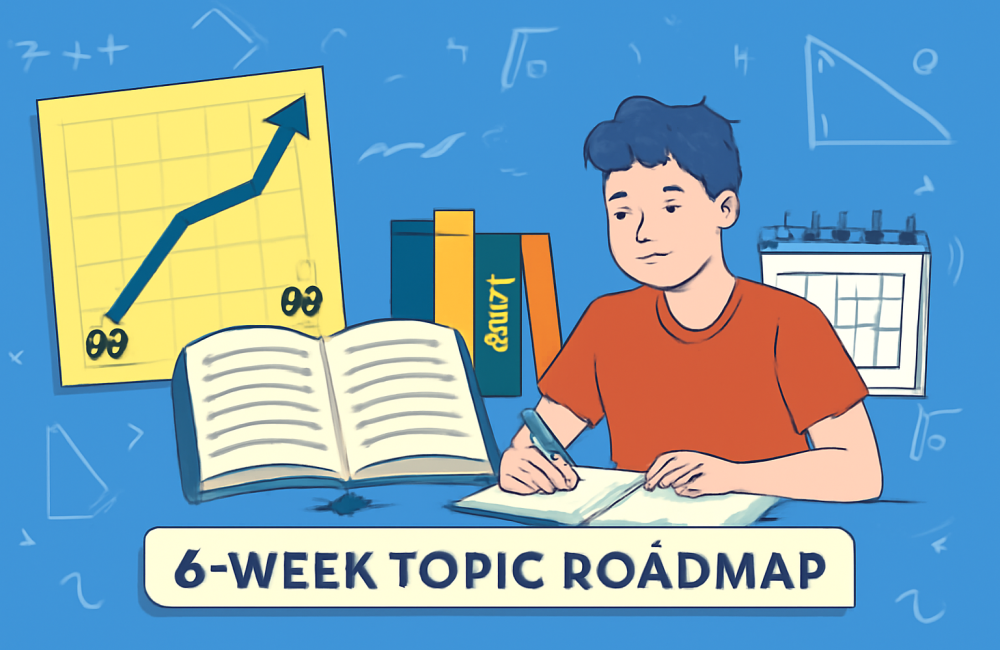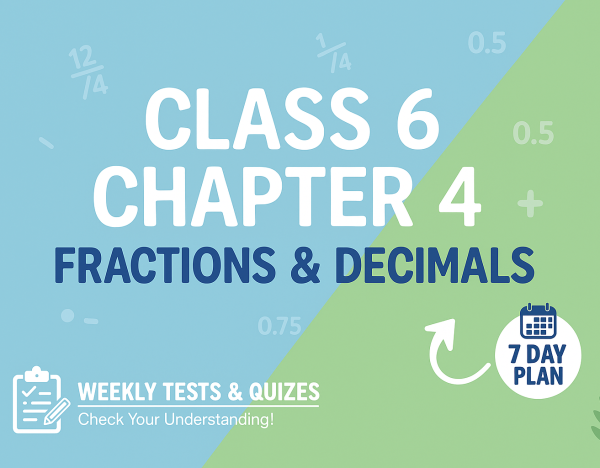Class 9 Maths is a very important platform for higher mathematics, which deals with number systems to geometry, and statistics. The syllabus used in CBSE schools is more or less based on NCERT textbooks, and thus, learning NCERT exercises is important. The 6-week plan will assist students (and parents) to focus on important concepts, practice, and apply structured daily routines to enhance understanding and scores. Class 9 Maths Improvement Plan, India.
Focus on Key NCERT Chapters
Give preference to high-weight NCERT topics. Indicatively, Polynomials (Ch. 2) presents factorisation and factor theorem, a test that is often administered. Algebra (Ch. 4 and Coordinate Geometry (Ch. 3) are developed, and Triangles (Ch. 7) deals with relations of congruence and area. Chords/tangent properties are dealt with in circles (Ch. 10), and data representation coupled with mean/median/mode are found in Statistics (Ch. 14). These ideas are frequently used in exams. Therefore, learners are expected to learn definitions, theorems, and sample questions in these chapters.
CBSE tests are NCERT based and thus, it is better to finish NCERT problems. Maintain a separate notebook of formulas and definitions to be able to memorize them in a short time. The theory and the problem-solving skills are developed by practicing NCERT examples and exemplar problems on a regular basis.
6-Week Study Plan
- Week 1: Number Systems & Polynomials. Review rational/irrational numbers and exponent laws. Begin Polynomials: learn types, zeroes, and simple factorisations. Solve NCERT problems daily.
- Week 2: Coordinate Geometry & Linear Equations. Plot points on the Cartesian plane and practice graphing. Learn to solve linear equations in two variables (graphical and algebraic methods). Cover word problems from the NCERT thoroughly.
- Week 3: Euclid’s Geometry, Lines & Angles. Understand Euclid’s axioms (intro) and angle theorems. Practice problems on parallel lines and angle sums. These provide the basis for triangle congruence next week.
- Week 4: Triangles. Master triangle congruence (SAS, ASA, SSS, RHS) and their consequences. Practice proving triangle relations and computing areas (many problems appear in exams).
- Week 5: Quadrilaterals, Circles & Heron’s Formula. Learn parallelogram properties and the midpoint theorem. Study circle theorems (equal chords, inscribed angles). Also, learn Heron’s formula for triangle area (Chap. 12) and do related exercises.
- Week 6: Surface Areas/Volumes & Statistics + Review. Cover 3D topics like surface area/volume (Chap. 13) briefly. Then study Statistics: organize data into frequency tables, and compute mean/median/mode from NCERT examples. Finally, devote extra days to revision: redo tough problems, solve NCERT exemplar questions, and full sample papers (see below) under timed conditions to improve speed.
Each week, set daily goals and practice a mix of easy and challenging problems. Allocate extra time to topics you find weak. After every 1–2 hours of study, take a short break (10–15 minutes) to refresh yourself. Writing down and revising key formulas each day helps retention.
Daily Timetable Example and Tips
Creating a realistic daily timetable helps manage study time effectively. For instance, one 9-hour schedule recommends tackling a difficult subject like Math during peak morning hours, using active practice (solving problems, writing formulas). Short 15-minute breaks are scheduled after each study session to recharge, matching expert advice to rest briefly after every 1–2 hours of work. Consistency is key: assign 1–2 hours each day for Math, alternating between learning new concepts and solving exercises.
Practice Resources and Tools
- NCERT Textbooks & Solutions: Complete all NCERT exercises. Free PDF solutions (e.g., Cuemath, TiwariAcademy) provide step-by-step answers. Practising these enhances both theory and application skills.
- Workbooks and Worksheets: Use chapter-wise worksheets and question banks (many are available online for CBSE Class 9). These give extra problems on each topic. Vedantu, EduRev, etc., offer free PDFs of important questions.
- Sample Papers & Mock Tests: Solve CBSE sample papers and previous-year Class 9 papers (if available). This exposes you to varied question types. As one guide notes, covering “all examples and kinds of questions given in sample papers” is crucial for effective preparation. Time yourself to improve exam pacing.
- Revision Notes/Flashcards: Make quick notes or flashcards for formulas, theorems, and tricky steps. Review them daily. Writing them out reinforces memory.
Tutoring and Doubt-Solving Support
There is nothing like seeking assistance when in a jam. The right tutor/ teacher can simplify things and demonstrate how to solve the problem. Get assistance whenever there is a suspicion rather than accumulating the suspicion. Even a small tutoring group of 1:2 can be effective: this way, individual attention is provided at a reasonable cost. Indeed, online mathematical tutoring can work surprisingly well; many people would testify that one-on-one teaching has done wonders, as the tutor can teach each student individually to their needs. With the question raised in a small group, students will feel freer to ask, and this will help in dispelling questions quickly.
Studies indicate that even struggling students may get up to date through online tutoring. Even the most frustrated learners, as one guide points out, can indeed improve through virtual tutoring to strengthen fundamentals and to increase test scores. Math can also become easier with the help of a competent tutor who will be able to increase confidence and elucidate problematic concepts. Nevertheless, it does not want to stop the active effort of the student: tutoring is meant to support, not to replace your daily practice.
FAQs
How can a Class 9 student raise Maths score from 50 to 80?
Practice NCERT daily, focus on weak chapters, revise formulas, and take mock tests.
Which Class 9 Maths chapters should I focus on for higher marks?
Polynomials, Linear Equations, Triangles, Circles, Statistics, and Number Systems.
How do I use a timetable to study Class 9 Maths?
Study Maths daily in small sessions, revise weekly, and include mock tests.
Are online tutors helpful for Class 9 Maths?
Yes, they give one-on-one attention, clear doubts quickly, and boost confidence.
What is the best way to clear doubts in Class 9 Maths?
Ask teachers, tutors, or classmates immediately—don’t let gaps pile up.
What resources should I use to practice Class 9 Maths?
Start with NCERT, then solve sample papers, worksheets, and revision PDFs.




